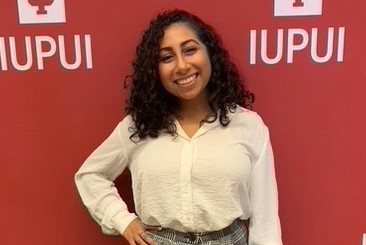After shadowing a local dentist and another dentist volunteering in Kenya’s maximum-security prisons, Barbara Shehata decided dentistry was her future. She’s particularly interested in working in an office that serves people with disabilities, a population she feels may be underserved. Her experience in Kenya taught her the importance of treating each client without judgement. She’s also very interested in cultural music and languages, which should serve her well as a medical professional. Read more about Barbara’s experiences as a UConn student.
What attracted you to the UConn College of Agriculture, Health and Natural Resources?
I wanted to branch out of focusing on the science track and be in a college that offers more classes that provide an overall outlook of health and its impact on the world.
Why did you choose your particular major?
I chose allied health sciences because I didn’t want to just study the science needed to become an intellectually competent future health professional, but I also wanted to further my studies in inter-professionalism in healthcare and the interactions between the diverse fields in health. I believe that it’s crucial to look at a patient holistically, and I wanted to take classes that encourage students to take into account every aspect of a patient’s life and how their identity can affect their overall well-being.
Which one of your UConn activities, internships or jobs was the most memorable? Why?
Being a part of the First Year Experience program has been the most memorable to me because of the networking connections I’ve created and the interpersonal skills I have gained. Getting the opportunity to teach classes on cultural competence, empathy versus sympathy, identity and mentorship has helped me further my own personal growth to be more confident and personable, while also giving me the opportunity to pass the torch to other students so that they may bring these skills to their own fields.
Name two other experiences that have enriched your studies.
The Brave Leadership Program has given me the opportunity to be a leader and educate others on social justice issues happening globally and nationally while also providing its students the opportunity to serve the local community as well. This program has taught me a lot about diversity and valuing the people who are different than you.
Last fall, I was given the opportunity to attend a conference in Indiana called Creating Conversations that Matter through the University, where I attended lectures and workshops on the importance of getting past the surface-level conversations with someone, regardless of the field you are working in, in order to get to know who they really are. I really enjoyed this conference because having productive and efficient doctor-patient conversations is something I will need to learn to do in the future.
What has been the biggest challenge in your UConn career?
The biggest challenge in my UConn career was stepping out of my comfort zone and improving my public speaking skills. I still have a lot to grow but the opportunities I’ve had at UConn have helped me overcome my fear of speaking in front of a large group of people. Now, I’m giving presentations to a room of 125 students, which I never could have imagined myself doing three years ago.
When do you expect to graduate? What then?
I will be graduating in May 2020 and will be attending the UConn School of Dental Medicine in the fall.
Is there anything else you would like us to know about you?
I love learning different languages. I am bilingual and have been trying to teach myself Spanish, Greek and Swahili over the last couple of years!



